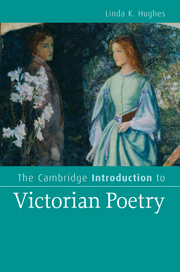Book contents
- Frontmatter
- Contents
- List of figures
- Preface
- Acknowledgments
- Editions cited
- Introducing Victorian poetry
- Part I The forms of Victorian poetry
- Part II The rhetoric of Victorian poetry
- Introduction to Part II
- 4 Poetry, technology, science
- 5 Poetry and religion
- 6 Poetry and the heart's affections
- 7 Poetry and empire
- 8 Poetic liberties
- 9 Resisting rhetoric: art for art's sake
- Part III Coda Close readings
- Glossary
- Notes
- Further reading
- Index
- Cambridge Introductions to Literature
5 - Poetry and religion
Published online by Cambridge University Press: 05 June 2012
- Frontmatter
- Contents
- List of figures
- Preface
- Acknowledgments
- Editions cited
- Introducing Victorian poetry
- Part I The forms of Victorian poetry
- Part II The rhetoric of Victorian poetry
- Introduction to Part II
- 4 Poetry, technology, science
- 5 Poetry and religion
- 6 Poetry and the heart's affections
- 7 Poetry and empire
- 8 Poetic liberties
- 9 Resisting rhetoric: art for art's sake
- Part III Coda Close readings
- Glossary
- Notes
- Further reading
- Index
- Cambridge Introductions to Literature
Summary
With Christians, a poetical view of things is a duty – we are bid to colour all things with hues of faith, to see a Divine meaning in every event and a super-human tendency.
John Henry Newman, review of The Theatre of the GreeksThe poet may imagine opinions, doctrines, heresies, cogitations, debates, expositions – there is no limit to his traffic with the moral any more than with the sensuous appearances of the universe; only, as a poet, he deals with all these as concrete things, existing in the objective air, and from which his own soul stands royally disentangled.
[David Masson], “Theories of Poetry and a New Poet” (1853)For the power of Christianity has been in the immense emotion which it has excited; in its engaging, for the government of man's conduct, the mighty forces of love, reverence, gratitude, hope, pity, and awe, – all that host of allies which Wordsworth includes under the one name of imagination.
Matthew Arnold, Preface, in God and the Bible (1875)Secular and sacred models of poetry have competed for primacy at least since Aristotle and Plato: Aristotle emphasizes poetry's imitative function and psychological effects in the Poetics; Plato's Socrates underscores poetry's link to divine inspiration in Ion. Nineteenth-century poetry has largely been conceptualized in secular terms, whether in Wordsworth's democratic conception of the poet as a man speaking to men in a state of heightened feeling, Kant's autotelic aesthetics, or John Stuart Mill's mediate position that poetry expresses feeling but the poet speaks only to himself.
- Type
- Chapter
- Information
- The Cambridge Introduction to Victorian Poetry , pp. 140 - 166Publisher: Cambridge University PressPrint publication year: 2010

